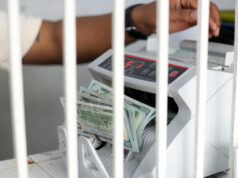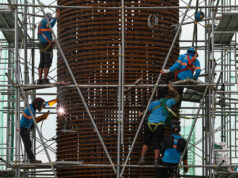Senate probes ‘failure’ of DoH health stations
By Camille A. Aguinaldo
PARTIES INVOLVED in the P8.1 billion Barangay Health Station (BHS) project on Wednesday pinned the blame on each other over the failure of the Department of Health’s (DoH) school-based program. The Senate committee on health, chaired by Senator Joseph Victor G. Ejercito, opened its inquiry on the alleged irregularities in the procurement and implementation of the BHS project, which started in 2015 during Janette P. Loreto-Garin’s term as health secretary.
Health Secretary Francisco T. Duque III and his predecessors Paulyn Jean B. Rosell-Ubial and Ms. Garin attended Wednesday’s hearing.
The BHS project was intended to construct 5,700 school-based rural health units to help bridge the gap on Filipinos’ access to health care. But it was revealed by Health Undersecretary Roger P. Tong-an, chairperson of the DoH task force investigating the project, that only 218 of the targeted 3,200 barangay health stations in the project’s first phase were constructed.
Mr. Duque said it was the project’s poor planning which led to the mess that the current administration of DoH is dealing with now.
“It is the way it was planned. The procurement, the implementation had already been marred with a lot of irregularities or deficiencies. So the planning stage was really terrible,” he said, citing the 2017 Performance Audit of the Commission on Audit (CoA) on the controversial project.
The CoA document revealed that the BHS project “was not effectively and efficiently undertaken” due to “unworkable project sites” identified for the project. This resulted in delays in the implementation and later its suspension.
In an interview with reporters, Mr. Duque later clarified that he was not blaming anyone for what had happened with the project. He merely pointed out the irregularities in the planning, procurement and implementation. He maintained that even incumbent and former officials should be held accountable.
“All of these will be elucidated, this will be cleared out if the fraud audit of CoA is released,” he said.
For her part, Ms. Garin said it was the leadership decisions of her successors, Ms. Ubial and Mr. Duque, to not support the program that led to “unsuccessful completion of the project.” She then asked Mr. Duque to pursue cases regarding the irregularities so government officials will be held accountable.
She added that when she assumed office, she encountered an even worse situation in the agency, which was also related to the BHS project.
“It’s a continuing process of fixing the gaps inside. So I was pointing that let’s just not focus on this problem. Let us focus on all problems that I inherited because it is connected,” she said.
J Bros Construction Corporation director Julieanne R. Jorge, the contractor in the project, blamed DoH for the project’s termination due to the agency’s failure to provide the project sites and refusal to pay the company in the first-progress billing as provided in the contract.“The failure of the DoH to implement this project in accordance with contractual provisions doomed the project and prejudiced the Filipino people,” Ms. Jorge said.
In an interview with reporters, Mr. Ejercito said the bulk of the problem lies with DoH for not validating whether the project sites were ready for construction.
Asked for possible legislation to address the issue, the senator said he wanted to prevent the realignment of savings from the national budget to government projects without congressional approval.
“In aid of legislation, that is what we’re looking because it looked like this became a habit already, the bad practice where the savings at the end of the year (are) used for other purposes. And we can see that it didn’t pass congressional scrutiny,” Mr. Ejercito said.
It was earlier revealed from a previous Senate hearing that the BHS project’s source of funding came from DoH funds meant to hire workers in the agency. The realignment of funds was done through a special allotment release order (SARO) issued by the Department of Budget and Management (DBM).
The same fund was also the source of funding for the purchase of Dengvaxia vaccines.



